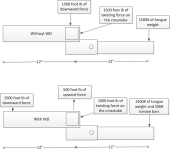jejeosborne
Veteran Member
Exactly, WD can help reduce rear axle loads by adding weight to the front axle, but it cannot change the GCWR or the vehicle axle limits.
I posted several links to Putman and Reese hitches which are rated for the truck's full load. I think Diamondpilot is the member who you are thinking of with one on his Tundra. Those hitches (as you say) do not change the vehicle ratings, but do allow you to haul a heavier trailer as long as you stay withing the manufacture's axle/vehicle weight ratings.
Aaron Z
I have been a part of many of these discussions. I have seen what Diamondpilot has posted in the past. I usually am on the same side of the arguement with Diamondpilot (high five) but disagree with putting on a heavier hitch to avoid using a WD hitch for the reasons I have stated. In addidtion, who has tested the truck frame to be strong enough for these higher loads?
This is sort of true and sort of not true. When some people say the "tow capacity of the vehicle," they are referring to things like suspension, brakes, frame, axle rating, and so forth. They are referring to the vehicle and not the hitch, ball, and so forth. They think of those as two separate systems. From that perspective, adding a WD system does not change the tow capacity of the vehicle. Other people, when referring to the "tow capacity of the vehicle," are referring to everything attached to the vehicle, short of the trailer. From that perspective, the WD system may increase the tow capacity of the vehicle, if it was the hitch's weight rating that was the limiting factor. In other words, if your vehicle (with factory hitch) has a tow rating of 5000 lbs without a WD system and a 10000 lb rating with a WD system, then adding a WD system could be said to increase the tow rating of the vehicle. But I know for my truck, the specs say the truck itself is rated for 13k, but the hitch is only rated for 10k (with WD). So I would say that with or without a WD system, my truck is rated for 13k, but I can only tow up to 10k (with a WD system), and with my current trailer, I can only tow up to 7k, because it's a 7k trailer.
They usually don't, and I don't know why. Probably money. There are a few exceptions. A regular poster on TBN (sorry--don't remember who) talks about his Tundra, which has a frame-integral hitch that can tow the truck's full 10k weight without a WD system. But most factory hitches require a WD system to achieve anything close to the truck's full rated capacity. And it's not "other safety reasons," because you can swap the factory hitch with an aftermarket one that equals or exceeds the truck's towing capacity without a WD system.
Joshuabadrwell, remember me on this post?: http://www.tractorbynet.com/forums/trailers-transportation/244387-axle-location-question-3.html
I am fully aware of towing guidelines. I see that you are correctly posting many good things since this eye opening experience that I helped you with. I am just pointing out that the towing capacity of any rig is equal to the weakest link of the chain. If you have a F450 pulling a load with an 1 7/8" ball rated at 3500 lbs, the towing capacity of that setup is 3500 lbs even though every other limit is much higher in the equation.
